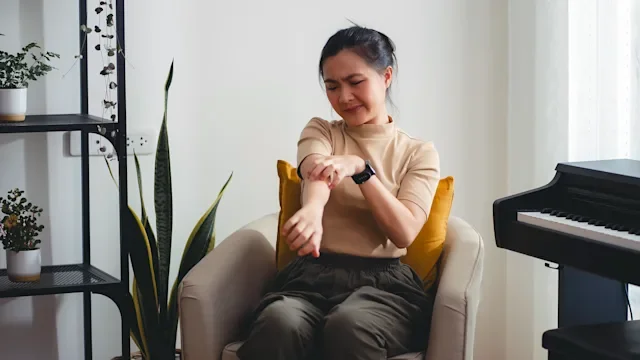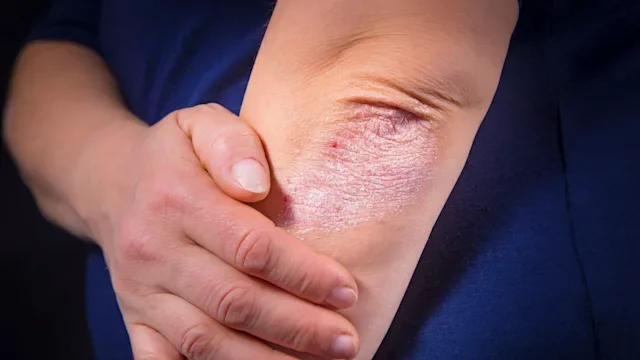Key takeaways:
Picankibart (IBI112), ebdarokimab (AK 101), and imsidolimab (ANB019) are injectable medications being studied for plaque psoriasis. They’re all in advanced clinical trials.
Injections aren’t for everyone. Oral pills and topical products are in the pipeline too. Icotrokinra (JNJ-2113) and piclidenoson (CF101) tablets are a pair of examples.
Many psoriasis medications are already available. Topical creams like clobetasol, oral pills like Otezla (apremilast), and biologics like Humira (adalimumab) are all common choices.
Your skin contributes to your appearance — color, wrinkles, freckles, and all. But it also supports your health. It protects you from germs and keeps your body at a stable temperature. That’s why protecting your skin is so important.
Yet, even with the best skin care routine, it’s hard to have perfect skin. Many things are out of your control. Inflammatory health conditions, such as psoriasis, can arise and disrupt your life. It can take many trips to the dermatologist and trying various moisturizers and medications before finding a treatment plan that works for you.
And that’s because there are quite a few options to choose from. Researchers have been developing and improving psoriasis medications for decades. The FDA has approved dozens of new psoriasis medications since the turn of the century alone — with a big focus on biologic medications. Health experts are expecting to see even more approved in the coming months and years.
Here, we’ll highlight nine new psoriasis medications in advanced stages of clinical trials. This isn’t an exhaustive list.
1. Picankibart
Picankibart (IBI112) is a monoclonal antibody in development for plaque psoriasis. This under-the-skin injection interferes with an inflammatory protein called interleukin-23 (IL-23). This is comparable to psoriasis medications like Skyrizi (risankizumab) and Tremfya (guselkumab).
Blocking IL-23 appears to be an effective treatment strategy for many people. Up to 86% of people receiving the medication in a phase 2 study achieved at least 90% symptom improvement after 1 year of treatment. More recent phase 3 study data also demonstrated positive results.
The company that makes picankibart is actively seeking approval in China. An FDA approval application may come next.
2. Icotrokinra
Icotrokinra (JNJ-2113) is an oral pill being studied for moderate-to-severe plaque psoriasis in people ages 12 and older. Unlike many other potential psoriasis medications, which are injectable biologics, icotrokinra is a small-molecule oral peptide that blocks IL-23.
In a recent phase 3 clinical trial, icotrokinra helped nearly 75% of people achieve clear or almost clear skin after 24 weeks (about 6 months). Side effects were similar between people who received icotrokinra or placebo, suggesting the medication is both effective and well-tolerated for treating psoriasis. It's also thought to be beneficial for difficult-to-treat scalp and genital psoriasis.
Psoriasis treatments: There are already many ways to manage psoriasis, from medicated creams and pills to injections and light therapy.
Common psoriasis triggers: From alcohol to medications, learn the most common triggers for a psoriasis flare-up.
Psoriasis on darker skin: See pictures of what psoriasis looks like on darker skin tones.
Johnson & Johnson, icotrokinra's manufacturer, applied for FDA approval of the medication in July 2025. If approved, icotrokinra would become the first oral IL-23 inhibitor approved for psoriasis.
3. Ebdarokimab
Ebdarokimab (AK 101) is a monoclonal antibody medication that treats plaque psoriasis by targeting two inflammatory proteins, interleukin 12 (IL-12) and IL-23. This is similar to how Stelara (ustekinumab) works. It's given as a once-monthly, under-the-skin injection.
A phase 3 study found that people who received ebdarokimab for psoriasis saw significant improvement in their skin symptoms. After 1 year, around 80% of people who received the medication achieved at least a 75% reduction in psoriasis severity.
- PrednisoneGeneric Deltasone and Rayos and Sterapred
- MedrolMethylprednisolone
- Fluticasone PropionateGeneric Cutivate and Flonase
This treatment is now in advanced stages of development. It already finished two phase 3 studies in China, and it won Chinese approval in April 2025. It’s not fully clear if or when its manufacturer intend to apply for FDA approval.
4. Imsidolimab
Imsidolimab (ANB019) aims to treat a different form of psoriasis: generalized pustular psoriasis (GPP). People with GPP develop pus-filled bumps on different parts of their body. Imsidolimab works by blocking the interleukin-36 (IL-36) receptor, a protein that causes inflammation in GPP.
People with GPP can experience sudden and dangerous skin flare-ups. Phase 2 study results published in July 2023 found that this intravenous (IV) medication may provide quick and lasting relief. Some people experienced an improvement in their symptoms in as little as 3 days. These positive effects lasted for up to 3 months at a time.
A phase 3 study found that over half of people who received a single IV dose achieved clear or almost clear skin after 4 weeks (compared to 13% who received a placebo). In a follow-up study, 100% of people who continued monthly treatment maintained clear skin.
Imsidolimab’s manufacturer is preparing its FDA approval application in 2025. If it’s approved, imsidolimab would likely be the second FDA-approved medication for GPP. The first one was Spevigo (spesolimab).
5. Vunakizumab
Vunakizumab (SHR-1314) is an under-the-skin, monoclonal antibody injection that blocks the inflammatory protein interleukin-17 (IL-17).
Its psoriasis study results have been positive, too. Phase 3 data published in January 2025 suggests that vunakizumab is safe and effective for treating moderate-to-severe plaque psoriasis. After 12 weeks (3 months) of treatment, over 70% of people experienced significant skin improvement. These benefits were generally maintained through 1 year of treatment.
Vunakizumab was approved in China in August 2024. Its manufacturer has not submitted a U.S. approval application to the FDA.
6. Piclidenoson
Piclidenoson (CF101) is a twice-daily tablet in the works for plaque psoriasis. It’s a type of A3 adenosine receptor (A3AR) agonist. Piclidenoson attaches to A3AR, which is a protein that’s often found on unwanted inflammatory cells in the skin. It destroys the cells after it attaches. No psoriasis medications that are currently approved work this way.
So far, phase 3 study data found that piclidenoson was significantly better than placebo at helping people achieve 75% symptom improvement within 4 months of treatment.
Another phase 3 study is now on deck for piclidenoson. It began in mid 2025, and it should run until 2028. The company that makes piclidenoson is expected to submit an FDA-approval application as its phase 3 trial program matures.
7. ESK-001
ESK-001 is an oral medication being developed for moderate-to-severe plaque psoriasis. It belongs to a class of medications called TYK2 inhibitors, which work by blocking a specific pathway involved in immune system inflammation. This is similar to how Sotyktu (deucravacitinib) works, but ESK-001 is designed to be more selective — potentially improving its effectiveness and safety profile.
Early study results are promising. In a phase 2 study, people who took ESK-001 daily experienced significant skin improvement. Multiple phase 3 trials are now underway to further evaluate ESK-001’s effectiveness. Initial data is expected in early 2026.
8. ICP-488
ICP-488 is another TYK2 inhibitor in development for plaque psoriasis. It works by targeting the TYK2 protein, similar in style to Sotyktu and ESK-001.
So far, phase 2 trials suggest that ICP-488 significantly reduces psoriasis symptoms in people with moderate-to-severe symptoms. Over three-fourths of participants who received the medication achieved at least 75% symptom improvement within 12 weeks of starting the medication.
A phase 3 trial kicked off in March 2025 to confirm these findings. If ICP-488 continues to show strong results, it could become another oral alternative to biologics for psoriasis.
9. Biosimilars to current psoriasis treatments
A biosimilar is a “highly similar” version of another biologic. It’s meant to be a more affordable, yet equally-beneficial, alternative. It’s like a generic version of a brand-name drug.
Several biosimilars are available for use in the U.S., including some for plaque psoriasis. For instance, you may receive a Humira (adalimumab) biosimilar or a Remicade (infliximab) biosimilar instead of the original product — depending on your health insurance and infusion center. Several Stelara biosimilars have also been approved over the past year or so.
Even more biosimilars for psoriasis are slated to become available in the coming years. Keep an eye out for products such as BAT2306, which is a proposed Cosentyx (secukinumab) biosimilar.
Which medications are already approved to treat psoriasis?
No matter what type of psoriasis you have, how severe it is, or what your treatment goals are, you have several psoriasis treatment options to pick from.
Topicals
Many people can treat psoriasis with topical medications alone, such as creams, ointments, and gels. Common options include:
Over-the-counter products like salicylic acid, coal tar, or calamine
Topical steroids like hydrocortisone, clobetasol, or triamcinolone
Vitamin D-based products like Vectical (calcitriol) or Dovonex (calcipotriene)
Tazorac (tazarotene)
Vtama (tapinarof)
Zoryve (roflumilast)
Combination creams, such as those that combine a steroid with calcipotriene
Oral medications
Topical medications aren’t always enough. You may need an oral medication, too. You may take them alone or in combination with other treatments.
Tablets, capsules, and liquids such as these can treat moderate to severe psoriasis:
Methotrexate
Acitretin
Neoral (cyclosporine)
Otezla (apremilast)
Biologics
Biologic injections manage psoriasis symptoms by targeting specific parts of your immune system. You may receive a biologic by itself or in combination with other psoriasis treatments. Some are infused into a vein, while others are injected under your skin:
Humira
Cimzia (certolizumab pegol)
Enbrel (etanercept)
Remicade
Cosentyx
Bimzelx (bimekizumab)
Siliq (brodalumab)
Taltz (ixekizumab)
Ilumya (tildrakizumab)
Skyrizi
Tremfya
Stelara (ustekinumab)
Spevigo
The bottom line
Many new psoriasis medications are in development. If approved, piclidenoson tablets would be the first medication of its kind. Icotrokinra could become the first oral IL-23 inhibitor approved for psoriasis. Imsidolimab infusions could offer fast-acting relief for a form of psoriasis that causes pus-filled bumps. And several new biosimilars may help with out-of-pocket savings.

Why trust our experts?


References
Akesobio. (n.d.). Akeso pipeline landscape.
Alumis. (2024). Alumis initiates ONWARD Phase 3 clinical program evaluating ESK-001, an oral TYK2 inhibitor, in moderate-to-severe plaque psoriasis.
American Academy of Dermatology Association. (n.d.). Psoriasis clinical guideline.
AnaptysBio. (2023). Anaptys announces positive top-line Phase 3 clinical trial results of imsidolimab (IL-36R) in generalized pustular psoriasis (GPP).
Bio-Thera Solutions. (2024). Bio-Thera Solutions and Pharmapark further expand partnership in Russia and other CIS countries with addition of BAT2306, a Cosentyx biosimilar.
Brownstone, N. D., et al. (2020). Biologic treatments of psoriasis: An update for the clinician. Biologics: Targets and Therapy.
Can-Fite BioPharma. (2022). Can-Fite announces positive top-line results from piclidenoson Phase III COMFORT study in moderate to severe psoriasis. Business Wire.
Can-Fite BioPharma. (2023). Can-Fite receives U.S. FDA’s go ahead for piclidenoson psoriasis registration plan. Business Wire.
ClinicalTrials.gov. (2023). A Phase 3 study of efficacy and safety of AK101 in subjects with psoriasis. National Library of Medicine.
ClinicalTrials.gov. (2024). A Phase 3 study in moderate-to-severe plaque psoriasis with piclidenoson to study safety and efficacy. National Library of Medicine.
ClinicalTrials.gov. (2024). A study to evaluate IBI112 in the treatment of psoriasis with moderate to severe plaque psoriasis. National Library of Medicine.
ClinicalTrials.gov. (2025). Efficacy, safety, pharmacokinetics of ICP-488 in patients with moderate to severe plaque psoriasis. National Library of Medicine.
Crescioli, S., et al. (2024). Antibodies to watch in 2025. mAbs.
Fidler, B. (2024). Alumis readies IPO to fund rival drug to Bristol Myers’ Sotyktu. BioPharma Dive.
Fishman, P. (2022). Drugs targeting the A3 adenosine receptor: Human clinical study data. Molecules.
Ghosh, S. (2024). Psoriasis biosimilars market is forecasted to reach an impressive USD 26,679.9 million by 2034, reflecting a robust CAGR of 11.2%. Future Market Insights.
Grasso, G. M., et al. (2025). ‘Strong data’ support ESK-001’s potential as oral treatment for plaque psoriasis. Healio.
InnoCare. (2024). InnoCare announces Phase II study results of TYK2 inhibitor ICP-488 meet primary endpoint in psoriasis patients.
Innovent Biologics. (2023). Innovent announces first patient dosed in a Phase 3 clinical trial (CLEAR) of picankibart (anti-IL23p19 monoclonal antibody) in patients with moderate-to-severe plaque psoriasis. PR Newswire.
Innovent Biologics. (2024). Innovent announces picankibart (IBI112) achieved primary endpoints in a Phase 3 clinical trial in treating moderate to severe plaque psoriasis, and plans to submit NDA to the NMPA. PR Newswire.
Johnson & Johnson. (2024). Icotrokinra delivered an industry-leading combination of significant skin clearance with demonstrated tolerability in a once daily pill in Phase 3 topline results.
Johnson & Johnson. (2025). Icotrokinra long-term results affirm promise of targeted oral peptide with high rates of durable skin clearance and favorable safety profile in difficult-to-treat scalp and genital psoriasis.
Keam, S. J. (2024). Vunakizumab: First approval. Drugs.
Lopez-Ojeda, W., et al. (2022). Anatomy, skin (integument). StatPearls.
Ludmann, P. (2024). Pustular psoriasis: Treatment. American Academy of Dermatology Association.
National Psoriasis Foundation. (n.d.). Current biologics on the market.
National Psoriasis Foundation. (2019). Two centuries of progress in one short timeline.
National Psoriasis Foundation. (2023). Oral treatments.
National Psoriasis Foundation. (2023). Over-the-counter topicals.
Sami, T. (2025). Akeso scores China approval for ebdarokimab in plaque psoriasis. BioWorld.
Vanda Pharmaceuticals. (2025). Vanda Pharmaceuticals and Anaptys announce exclusive global license agreement for Vanda to develop and commercialize imsidolimab, an IL-36R antagonist. PR Newswire.
Waldron, J. (2024). Innovent, awaiting Chinese regulators' verdict, posts another psoriasis win for IL-23 drug. Fierce Biotech.
Warren, R. B., et al. (2023). Imsidolimab, an anti-interleukin-36 receptor monoclonal antibody, for the treatment of generalized pustular psoriasis: Results from the phase II GALLOP trial. British Journal of Dermatology.
Yan, K., et al. (2024). Efficacy and safety of vunakizumab in moderate-to-severe chronic plaque psoriasis: A randomized, double-blind, placebo-controlled phase 3 trial. Journal of the American Academy of Dermatology.














